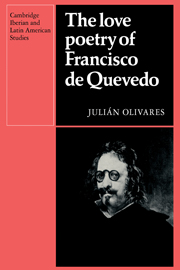Summary
No hay soledad ni hombre solo, si sabe aprovecharse el alma de su cuerpo y el cuerpo de su alma. (‘sentencia 488’) [There is no solitude nor a solitary man, if the soul can avail itself of the body, and the body of the soul.]
With regard to Quevedo's stoically influenced poetry, Blecua perceives that the poet's originality and authenticity consist in his ‘having turned those ideas into flesh and blood (in having lived the stoic “theory,” if you will), in having made them his own with all his passion and anguish’ (1971, p. c). This statement applies with equal vigor to Quevedo's love lyrics and to the ‘theory’ of courtly love.
Quevedo's love poetry makes use of many commonplaces, yet if we accept these as poetic truth, the poetry can move us intensely. This is due, first, to the style, which through conceits – organic and metaphysical – can unify the disparate elements of experience and disclose the paradoxes and tensions of love. It is due, secondly, to the poet's ability to penetrate deeply into the particular from the general, thereby reaching the heart of the personal anguish that the commonplaces conceal through their conventional lip service to the ideal. Quevedo's successful reworking and defamiliarization of commonplaces is also often accomplished by moving them into other contexts and areas of experience, with the result that the commonplaces have only a vestigial association with their models.
- Type
- Chapter
- Information
- The Love Poetry of Francisco de Quevedo , pp. 142 - 153Publisher: Cambridge University PressPrint publication year: 1983

